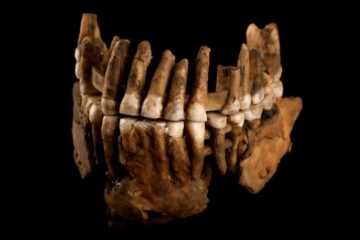Alison George in New Scientist:
 Genetic analysis of a Neanderthal fossil found in France reveals that it was from a previously unknown lineage, a remnant of an ancient population that had remained in extreme isolation for more than 50,000 years. This finding sheds new light on the final phase of the species’ existence.
Genetic analysis of a Neanderthal fossil found in France reveals that it was from a previously unknown lineage, a remnant of an ancient population that had remained in extreme isolation for more than 50,000 years. This finding sheds new light on the final phase of the species’ existence.
The fossil, dubbed Thorin after a character in J.R.R. Tolkien’s The Hobbit, was discovered in 2015 at the Grotte Mandrin in the Rhône Valley in southern France when Ludovic Slimak of the Centre for Anthropobiology and Genomics of Toulouse uncovered some teeth in the cave’s soil. The skeleton was painstakingly excavated over the next nine years to reveal 31 teeth, the jawbone, part of the skull and thousands of other bone fragments.
This was an incredible discovery in itself, as remains of Neanderthals – who lived in Eurasia from around 400,000 years ago until they went extinct around 40,000 years ago – are exceedingly rare.
Even more surprising was that Thorin’s genome could be obtained from a fragment of one of his teeth, as DNA isn’t typically preserved in warm climates. This revealed that the fossil was from a male, but opened up a mystery that took years to solve.
More here.
Enjoying the content on 3QD? Help keep us going by donating now.
